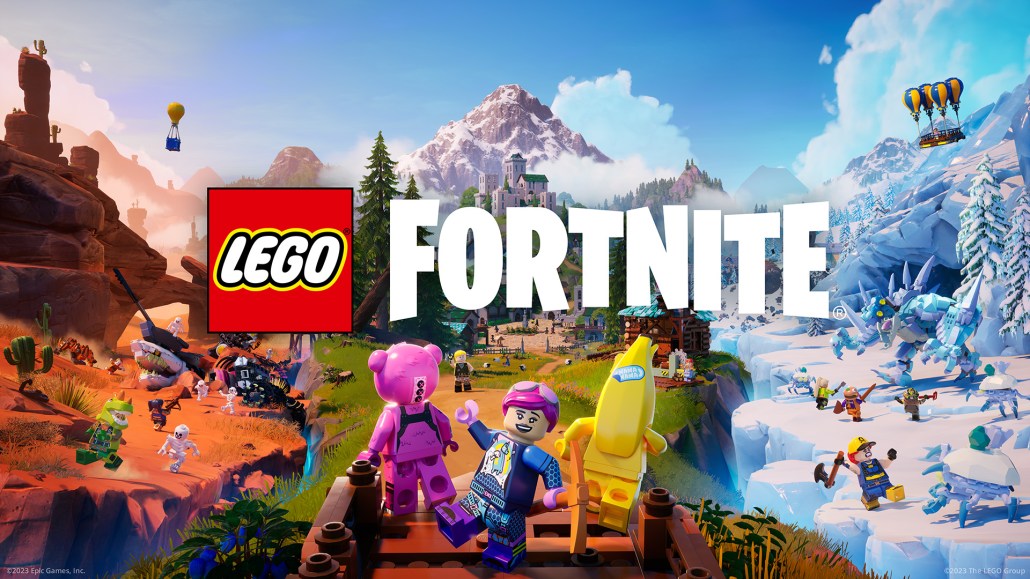By Alexander Lee • December 7, 2023 • 4 min read •

Epic Games
Today, Dec. 7, marks the release of “Lego Fortnite,” a collaboration between the popular Danish toy brand and Epic Games. The launch is one of Epic’s most ambitious brand partnerships yet — and it showcases Lego’s skillful use of video games to market both its core products and its homegrown intellectual properties.
The crux of the long-term partnership between Lego and Epic Games is an expansive open-world game built inside Epic’s Unreal Engine. The game worlds of “Lego Fortnite” are 20 times the size of the digital environment of “Fortnite: Battle Royale” — and users are able to populate them with numerous structures made of virtual Lego bricks, making the experience a showcase of the Lego brand.
“We’ve recreated roughly 10,000 Lego bricks into this digital form pretty well,” “Lego Fortnite” creative director Eric Williamson told reporters during a Dec. 4 demo event for the game. “But we actually take that even a little bit of a step further in ‘Lego Fortnite’ — so anything that you see in the game, or in the trailers, is stuff that you can recreate in the real world with Lego bricks.”
Lego has been integrating its products and IP into video games for much longer than many other non-endemic brands. The company released its first premium video game, “Lego Island,” in 1997, and has since sold tens of millions of copies of titles such as “Lego Star Wars” and “Lego Indiana Jones.” With this wealth of gaming experience — and a suite of games that are inherently tied to the brand — Lego understands that high-quality gameplay is the most useful way to keep customers engaged and spending.
“First and foremost, we are product driven, not marketing driven,” said Remi Marcelli, svp of gaming and metaverse experiences at the Lego Group. “We love marketing, of course, and we do our best to make the Lego brand more relevant to more people everyday, but delivering a great game has been, and will remain, our No. 1 priority.”
Although Lego already has its own pre-existing gaming department, the brand’s decision to partner with Epic Games to build its metaverse platform allows it to plug into the hundreds of millions of gamers already active inside “Fortnite” and other Epic titles. Users are able to link their Epic Games accounts to their Lego Insiders IDs, making the integration of the two companies’ online communities relatively simple.
“Quite frankly, it’s a brilliant partnership,” said Margot Rodde, founder of the Fortnite Creative studio Creators Corp. “It’s brilliant from the Lego side of things even more than it is from the ‘Fortnite’ side of things, because it’s very easy to put it into a digital environment that already exists.”
There are convincing reasons for Epic Games to partner with Lego, too. At the moment, platforms such as Roblox and Minecraft are perceived by some brands as more child-friendly than “Fortnite,” which is built around a first-person shooter game with some violent elements. Bringing Lego into the platform could allow it to become more family friendly and capture some of the audience of competing metaverse platforms. It doesn’t hurt that “Fortnite” is much more brand-friendly than Minecraft.
“You always think, as a marketer, that platforms are after older audiences, because they’ve got more buying power,” Rodde said. “But I think ‘Fortnite’ wants both. I think they would like the older audience through the ‘Fortnite’ main game and Fortnite Creative, and then the partnership with Lego was their strategy to bring in a younger audience.”
At the moment, “Lego Fortnite” remains primarily an entertainment product, not an e-commerce opportunity. Given the presence of thousands of genuine Lego bricks within the experience, however, it’s not hard to imagine a future in which users would be able to build inside the game and then order their creations to be shipped to their doorsteps to build in real life. Marcelli was reticent about the commerce potential of the collaboration, but left the door open for future expansion in that area.
“As for physical Lego sets connected to ‘Lego Fortnite’ — we don’t have anything to announce today,” he said. “But who knows where our partnership could take us in the future.”
https://digiday.com/?p=528035
